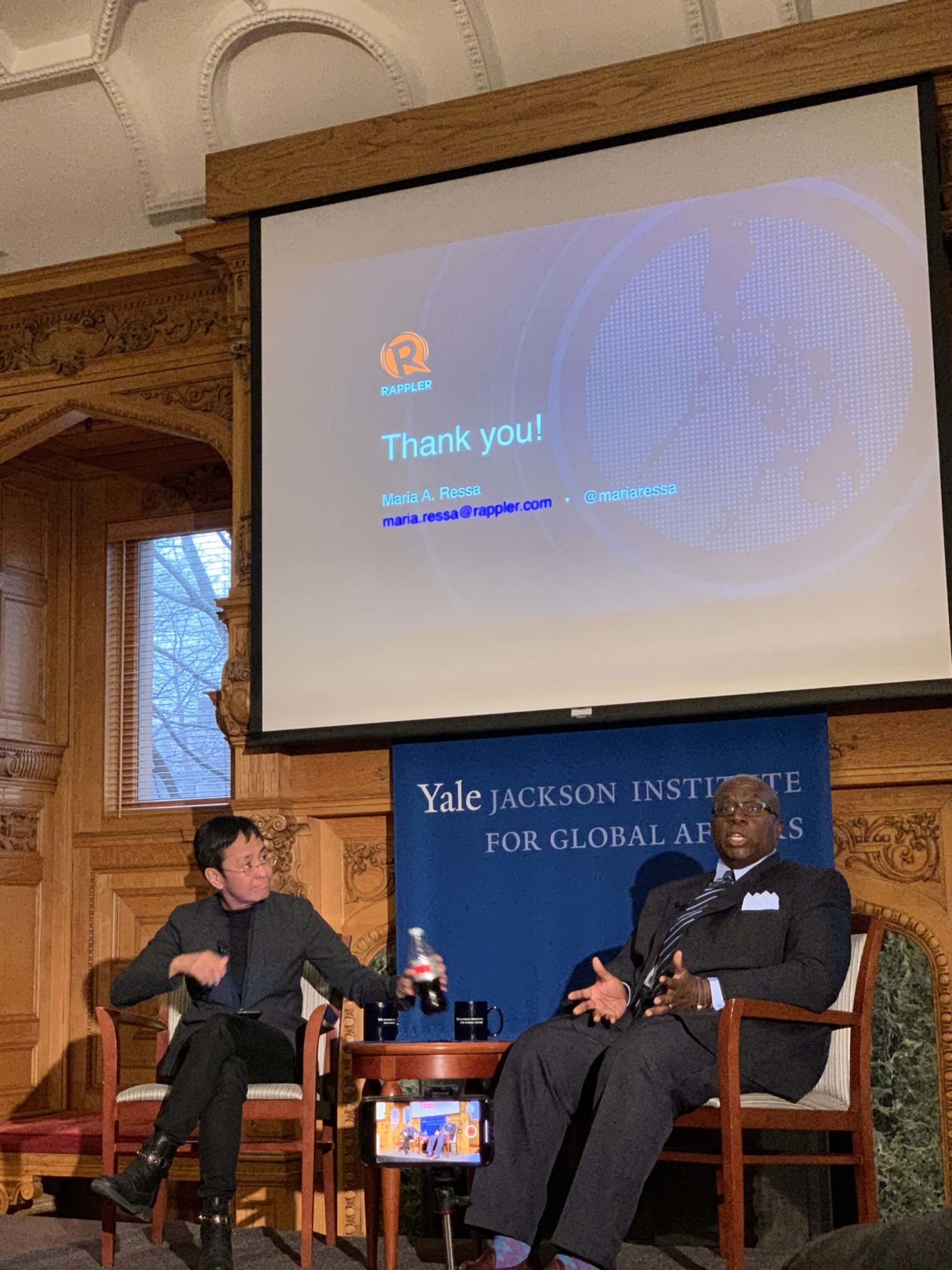
Larissa Jimenez
Faced with 11 charges imposed by Filipino President Rodrigo Duterte’s government, Maria Ressa, the former CNN journalist, had to post bail eight times to be in New Haven on Tuesday. She spoke about her experience fighting against disinformation and defending journalism and democracy.
Despite the adversity she has faced, Ressa remains committed to defending free speech against “manufactured attempts” from Duterte’s government to suppress it. Students, faculty and community members gathered in Horchow Hall to listen to her story and learn about Rappler, a company she founded to provide social justice-oriented media content in the Philippines.
“Why should you care about the Philippines? Why is our dystopian present your dystopian future? The problem is very simple,” she said in the talk. “Authoritarian populist style leaders have used technology to make lies laced with anger and hate spread faster than facts. Without facts, you can’t have the truth; without the truth, you can’t have trust. Without any of these, democracy as we know it is dead.”
The talk was hosted by the Jackson Institute for Global Affairs and moderated by U.S. Ambassador Harry Thomas Jr., a Kissinger Senior Fellow at Jackson. After Ressa discussed the global phenomenon of disinformation in both social media and Filipino state press, Thomas moderated a conversation that entertained questions from the audience surrounding Ressa’s work and life mission.
Edward Wittenstein, deputy director for Leadership Programs at Jackson, introduced Ressa as a “personal hero” of his, “not a soldier, but a warrior, a tireless defender of democracy … both in the Philippines and in the world, and often in the face of risk.”
Ressa has been a journalist in Southeast Asia for over 30 years, working for CNN as a lead investigative reporter in the region. In 2012, she co-founded Rappler, one of the largest social news networks in the Philippines, and currently serves as chief executive officer for the platform. According to its website, Rappler’s mission includes the desire to instill in its readers a motivation for social justice, inspiring action and promoting social change.
According to Ressa, Rappler was one of the first to coin the term “patriotic trolling,” defined as “state-sponsored online hate and harassment campaigns to silence and intimidate.” This form of trolling, Ressa said, is a manner in which people “flood the market” with false news.
Our world today, as Ressa sees it, is one plagued by a “climate of fear,” in which “anyone who questions a brutal drug war and supports those who fight for truth” is vulnerable to attacks.
In 2018, she was featured as one of Time Magazine’s “Guardians” in the “War on Truth”. After hearing about it, Ressa said she could not believe it.
“I thought it was fake news,” she said.
A passionate advocate against the spread of untruths, Ressa made the Philippines her case study for the Tuesday talk, discussing the dangers of disinformation on the national scale.
Recalling an exclusive interview she conducted with former data consultant for Cambridge Analytica Christopher Wylie, Ressa mentioned that he had previously referred to the Philippines as a “petri dish” — a testing ground for disinformation tactics. In the interview, Wylie pointed to “endemic” corruption and the absence of a just media environment in the Philippines as factors that made the country vulnerable to manipulation tactics. These tactics, which weakened the Philippines’ institutions and political climate, could later be “imported” to the United States and Europe.
Ressa urged the audience to “demand accountability” from the powerful — including tech companies and the government. Journalists, according to Ressa, “have lost their gatekeeping powers,” which have fallen to the tech industry. She encouraged aspiring journalists and students to further develop their moral compasses.
“The better you understand data, technology, and behavioral science, the better your journalism will be,” Ressa said.
In interviews with the News following the talk, students and community members reflected on Ressa’s mission and beliefs.
“As a Filipinx American, I’m constantly reflecting on my position in politics as it relates to both countries,” said Bella Bolayon ’23, a staff writer for the News. “Maria Ressa shows us the indelible connection between the authoritarian regimes of both Duterte and Trump to lace information with lies and hatred.”
Bolayon told the News that, to her, journalism is a form of activism. She said that Ressa “lives this” and fights for the truth in “this world of demagogues.”
“Due to Duterte’s presidency and drug war, there is a human rights crisis in the Philippines, and we as media consumers, have an inherent responsibility to call out and address injustice,” she said.
Responding to one of Ressa’s points about the difficulty of regulating the spread of disinformation on online platforms, Kyle Kesses, a local videographer, writer and entrepreneur from Woodbridge, Connecticut agreed that part of the problem is that “the internet is an open ocean.”
Shani Samtani YNUS ’21 told the News that, as a Philippine national studying abroad, she trusts Rappler news updates because she has “full faith in Maria Ressa’s journalistic values.”
In Samtani’s opinion, “in a world of fake news, it is becoming harder to uncover the truth, and even harder to expose it to the masses.”
“[Ressa’s] persistence even in the face of this phenomenon [of disinformation], enabled by big tech and the money behind it, is something that has resonated with me since I started following her career in 2017,” Samtani said.
The Jackson Institute for Global Affairs was founded in 2009.
Larissa Jimenez | larissa.jimenez@yale.edu
Maria Fernanda Pacheco | larissa.pacheco@yale.edu







